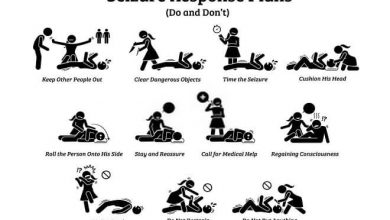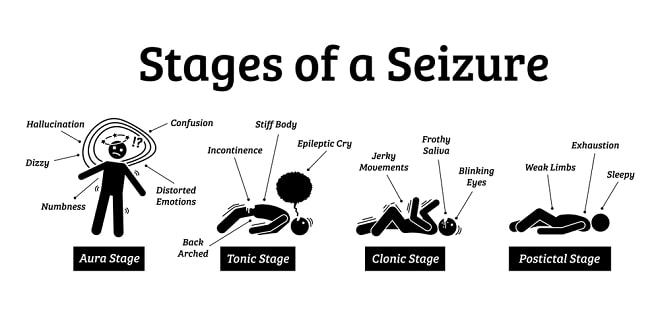Epilepsy
PREGNANCY AND EPILEPSY

BIRTH CONTROL Q. Will birth control pills make my seizures worse?
A. Birth control pills are a form of hormonal contraceptive, and none of the forms of hormonal contraceptives will make your seizures worse. However, certain medications that control epilepsy can reduce the effect of hormonal contraceptives and therefore increase your chance of becoming pregnant.Be sure the doctor who prescribes your birth control pills, implants or injections is aware that you’re also taking an antiepileptic medication. Your birth control dose may need to be increased. Always use condoms or a diaphragm during the first month of hormonal contraceptive use.Birth control pills are the oral form of hormonal contraceptives, and other than abstinence from sexual intercourse, they are the most effective means of preventing pregnancy.Other types of hormonal birth control include:-Contraceptives that are implanted under the skin like levonorgestrel (Norplant).-Contraceptives that are implanted within the uterus like the IUD Progestasert.-Contraceptives that are given by injection like medroxyprogesterone (DepoProvera).None of these hormonal contraceptives will make your seizures worse, but if you are taking a low or mini dose of any hormonal contraceptive, and you are also taking antiepileptic medication, you may become pregnant.Certain antiepileptic medications such as Dilantin, phenobarbital and Tegretol can speed up the metabolism of hormonal contraceptives including birth control pills. The result can make the contraceptive less effective. As a woman with epilepsy, you will likely need a higher dose of contraceptive than your doctor would normally prescribe.Be certain the doctor prescribing your contraception knows that you’re taking an antiepeleptic medication.Always use condoms or a diaphragm during the first month of hormonal contraceptive use.
Q. I’m not certain I want to become pregnant right now. Other than birth control pills, what types of contraceptives can I use?
A. Women who have epilepsy can use all forms of birth control including condoms, diaphragms, IUDs, and contraceptive foams and jellies.Each woman should choose the birth control method that’s best for her. The choice of a birth control method should be based on your own individual needs. Your doctor or nurse practitioner can help you choose the method that’s best for you.The combination of a condom used with contraceptive foam is a good “barrier” form of birth control if you use it every time you have sex. Other than abstinence from sex, latex condoms are the only way to stop sexually transmitted diseases including AIDS. Even if you use another method of birth control, you should consider using latex condoms to protect yourself from sexually transmitted diseases.A diaphragm used with contraceptive jelly is another effective means of birth control, but again you must use it every time you have sex. Another good choice is an intrauterine device, or IUD. The IUD is made of plastic and copper and is placed inside the uterus by your doctor or nurse practitioner. It can prevent pregnancy for up to 10 years.None of these birth control methods will affect your seizures or interfere with your antiepileptic medications.If you have completed your family or are certain that you never want to have children, you may want to choose a permanent form of birth control called sterilization. For women the procedure is a tubal ligation, and for men it is a vasectomy.
Q. Does having epilepsy make it harder to get pregnant?
A. Women with epilepsy are less likely to become pregnant than women without epilepsy.Doctors have identified several problems associated with epilepsy that could impede your ability to become pregnant. Despite this, most women with epilepsy are able to conceive and give birth to normal, healthy children. As a group, women with epilepsy have fewer children than women without epilepsy, and there are a variety of reasons.A woman with epilepsy may be less likely to have children because of problems caused by her seizures. Or she may have problems with her menstrual cycle and reproductive organs. Some women may not pass eggs from their ovaries regularly. Or their ovaries may develop cysts, a condition called polycystic ovarian disease.All of these problems are classified as reproductive/endocrine disorders. Your doctor can test for them by having you measure your basal body temperature every morning before you get out of bed, and by giving you a painless ultrasound test to look for ovarian cysts.Sometimes people with epilepsy (and this applies to both women and men) are simply not as interested in sex as are most people in the general population. This may be due to the fact that seizures start in the temporal lobe of the brain. The temporal lobe is connected to an area of the brain called the limbic system where emotional behavior is thought to reside. Sexual disinterest can also be a side effect of some antiepileptic medications. If this is a problem, you should discuss it with your doctor.Many women with epilepsy are discouraged from becoming pregnant because of the attitudes of other people. Fears of having a child with epilepsy, birth defects or other problems can contribute to this. It’s important to remember that most women with epilepsy can and do have normal, healthy children. SEIZURES
Q. Are seizures caused by my menstrual period?
A. No, menstrual periods do not cause seizures, but sometimes seizures may worsen or be clustered during a menstrual period. This is especially true for women who menstruate without ovulation or menstruate irregularly.Your doctor may prescribe drugs to restore ovulation or regularity to your menstrual cycles. Taken with your anticonvulsant medication, this type of treatment often improves seizure control.Some women seem to experience their seizures only or mainly during the days just before their menstrual period begins. This is called catamenial epilepsy. You should remember that seizures are random events and sometimes may occur around a menstrual period simply by chance alone. But if there is a consistent pattern of seizures just before the menstrual cycle, you need to let your doctor know.Many women with catamenial epilepsy have menstrual periods but do not ovulate, which means they do not release an egg from their ovaries. Other women may have very irregular cycles. Your doctor may prescribe drugs to restore ovulation or make your cycles more regular. This often helps improve seizure control, but is not a substitute for anticonvulsant medication.
Q. If I become pregnant, will I have more seizures?
A. Most women will see no change in their seizures, About one-third of women with epilepsy have more seizures when they are pregnant. Your chances of having more seizures can be reduced by achieving good seizure control before pregnancy, by getting plenty of sleep during pregnancy and by carefully taking your medication. While an increase in seizures occurs in about one-third of pregnant women with epilepsy, there are important steps you can take to reduce your risk of being in this group.First, let’s take a look at the common factors that increase seizures in pregnant women.1. Poor seizure control prior to pregnancy.2. Failure to take antiepileptic medication as prescribed.3. Lack of sleep.4. Changes in the metabolism of antiepileptic drugs caused by pregnancy.The most important step toward reducing your risk of increased seizures is to work with your physician to get your seizures under control before you become pregnant. Part of this step will be to take your medication regularly- something you need to do before, during and after your pregnancy.Getting adequate sleep is another important factor in reducing your risk. This can be difficult when you’re pregnant, especially if you have small children at home. If lack of sleep has caused an increase in seizures in the past, you’ll need to be even more careful to get your rest during pregnancy.It’s a very good idea to take the time to identify other things which have caused you to have seizures. These might include emotional stress, fatigue or alcoholic beverages. Once you are pregnant, you will want to make a special effort to avoid these and other factors known to precipitate past seizures.Pregnancy changes every woman’s body metabolism. For a woman with epilepsy, pregnancy also changes the body’s level of antiepileptic drugs. Your level of AED’s will fall as your pregnancy progresses, becoming lowest right before your delivery. The proportion of an AED which is attached to proteins in the blood or “bound” gets smaller. The proportion of the AED which is not attached to those proteins or “unbound” may actually get bigger. Your doctor will check your blood levels regularly, and your AED dose may be periodically increased to prevent seizures as your pregnancy advances.Keeping an accurate record or calendar of your seizure frequency and medication intake can be helpful to both you and your physician. Such a record can not only help you remember to take your antiepileptic drugs, it can also help your physician better evaluate and anticipate the AED levels in your blood.
Q. If I have seizures when I’m pregnant, will they harm my baby?
A. Seizures, particularly grand mal (generalized tonic clonic), may harm your baby, especially if they occur during the last month of pregnancy or during labor. Grand mal seizures have not been linked to birth defects, but one study reported a slight increase in overall problems for babies born to mothers who had seizures while they were pregnant.Although many mothers who have seizures also have perfectly normal babies, it should be a priority to reduce those seizures during pregnancy. The best way to minimize risk to your baby during pregnancy is to minimize your chance of having a seizure. Generalized tonic clonic (grand mal) seizures can cause miscarriages, although this is a very rare occurrence. Generalized tonic clonic seizures during the last month of pregnancy can cause injury to the baby. And generalized tonic clonic seizures during labor reduce fetal heart rate, which can indicate that the baby is in distress. The reason for the heart rate drop is not clearly understood. It is most likely due to a decrease in oxygen because the mother is not breathing adequately, or to a decrease in blood supply during the seizure, or both.Generalized tonic clonic seizures during pregnancy have not been associated with birth defects. However, one study reported an increased risk for any adverse outcome if the mother experienced a seizure during pregnancy.For these reasons, it is important to reduce the number of seizures you have during pregnancy. Be sure to take your medication as prescribed and to avoid those things which may cause you to have a seizure. Notify your neurologist whenever you have a seizure.If you’re pregnant, don’t panic if you have a seizure. Remember, there are many normal, healthy babies born to women who had seizures during their pregnancy. But like them, you’ll need to do everything you can to minimize the risk to your unborn child.Work closely with your doctor to reduce your seizures as much as possible.
Q. Am I more likely to have a seizure during delivery? Is this dangerous?
A. Seizures seldom occur during delivery. A seizure during labor is usually not dangerous, but can make your delivery more difficult. During labor, a woman’s breathing increases, this hyperventilation, coupled with the pain and anxiety of giving birth, can occasionally lead to a seizure. If a seizure should occur during delivery, your obstetrician will be prepared to deal with the situation. Intravenous medication may be administered to stop the seizure. If the seizure is prolonged, your obstetrician may decide to perform a caesarean section to protect the baby.Taking your medication as prescribed, before and throughout labor, is important in order to maintain your antiepileptic drug levels.Sometimes seizures during labor may not be related to epilepsy but might be associated with the pregnancy itself. This condition is called eclampsia, and symptoms leading up to the seizures are called preeclampsia. Your obstetrician will monitor you for these symptoms.
Q. What if I have a seizure while I’m holding the baby?
A. There is no way to ensure that you won’t have a seizure while you are caring for your new baby.Always have a plan to protect the baby if a seizure occurs. Take your medication as prescribed. Get plenty of sleep. And don’t hesitate to ask family and friends for help if the need arises. It is not uncommon for a woman with epilepsy to have a seizure while she is caring for her baby. If you have a warning before you have a seizure, you can maintain a secure area in each room of your house where you can safely lay down the baby if you feel a seizure coming on.Some women don’t experience an immediate warning before a seizure, but they may feel a bit strange for several hours before having a seizure. If this describes you, you may want to have a friend or family member stay with you during a day when such a feeling occurs.Whether or not you have one of these warnings, you can minimize the risk of potential harm to your baby by taking the following precautions whenever the two of you are alone:* If you use a changing table, make sure your baby is always strapped in. Or you may want to change your baby’s diapers and clothing on the floor.* Never give your baby a bath by yourself. Instead, make sure someone else is with you in the room.* Always fasten the safety straps whenever you put your baby in an infant seat, even if you intend to be right there.* If you do not have grand mal or other falling-type of seizures, you may want to use a clothfront baby carrier whenever you are walking or standing and holding your baby.* When feeding your baby, you may want to use an infant seat, or use pillows to make a comfortable seat on the floor.* Never hold your baby while cooking or ironing.Although taking your medication as prescribed by your physician is the most important factor in reducing the chances of having a seizure, there are other ways to reduce the risk. It is very important that you to get adequate sleep. During the period when you first bring the baby home, you may need to enlist the help of family and friends to ensure that you get enough rest. You will need to learn to sleep when the baby sleeps, which can be difficult if you have other small children and no one to help you.Family members may also be able to help you during the night, by taking turns with feedings. Some mothers who breast feed extend their sleeping time by pumping their breast milk into bottles and then refrigerating it, so another family member can feed their baby at night.At least one study has proven that seizures are indeed more likely to occur in the postpartum period. Your body has been stressed by the processes of labor and delivery. It’s hard to find time to rest. You may be excited and anxious. Your hormones are changing. All this contributes to stress, and sometimes to sleep difficulties as well.During this period your neurologist will want to check your antiepileptic drug levels to make certain they’re within a range to protect you from having seizures. You will also want to make sure that those AED levels are not too high. Your doctor or nurse will be able to explain the symptoms of high drug levels. Even though you are taking the same amount of medication as you were before your delivery, those levels can rise during the postpartum period. This is why it is so important to continue to see your neurologist. ANTIEPILEPTIC DRUG THERAPY
Q. If I become pregnant, shouldn’t I discontinue my antiepileptic medications?
A. No. Any changes in your medication should be planned before you become pregnant.If a decision is made to change or discontinue your antiepileptic drugs, it must be made by your neurologist.Your antiepileptic medication should never be discontinued abruptly. Unless you have been free of all seizures for at least two years, you will need to continue with antiepileptic medication during your pregnancy. Ideally, it’s best not to take any medication while you are pregnant, but in reality, most women with epilepsy will have seizures if they discontinue their AED.Whether or not you will be able to safely discontinue your antiepileptic medications during pregnancy is a decision that only your neurologist can make. Any change in your medication regimen should be made before you become pregnant. This gives you and your physician enough time to evaluate how you might do with less medication, with a different medication, or possibly without any medication.Usually, women don’t suspect they are pregnant until their fourth to sixth week of pregnancy. By that time, if there are any harmful effects from their antiepileptic medication, most of the results of those effects would have already occurred.During pregnancy, the level of antiepileptic medication in your blood will gradually decline, even though the dose remains unchanged. In order to protect you from seizures, your physician may need to increase your dosage as your pregnancy progresses.
Q. I’m taking three different anticonvulsants. Isn’t this worse than taking just one if I plan to get pregnant?
A. Pregnant women who take more than one antiepileptic drug have a greater chance of having a baby with a birth defect. We don’t know if this is because of the multiple drugs or because of the types of epilepsy that require the multiple drugs.Some women need more than one anticonvulsant to control their seizures. Multiple antiepileptic drug therapy has been associated with an increased rate of major and minor birth defects, but this does not prove that the medications cause the birth defects.It is certainly possible that women who require multiple drugs to control their seizures may have a more severe form of epilepsy. This type of epilepsy might prove to be associated with the development of congenital malformations in their children.The preferred treatment for all patients with epilepsy is to take the least number of different drugs possible and still control the seizures. Because we do not know for certain what might cause a birth defect, this treatment guideline seems especially appropriate for a woman who has epilepsy and wants to become pregnant.Your neurologist will need to determine if reducing your number of medications is an option open to you. BIRTH DEFECTS (MALFORMATIONS)
Q. My doctor told me that because I need to take antiepileptic medication, I should never get pregnant. Now that I am pregnant he recommends an abortion, but I want my baby. Am I wrong to think that my baby will be okay?
A. Since you have epileptic seizures, your risk of having a baby with a birth defect is about double the risk for the general population. You also have an increased risk of miscarriage or stillbirth, about triple that of the general population.Even with those risks, there is still a better than 90 percent chance that your baby will be just fine.Only you can decide whether you want to terminate your pregnancy or carry your baby to term. For women who have epilepsy, the risk of having a baby with a birth defect is double the risk for women in the general population. Even so, mothers with seizures have a better than 90 percent chance of having normal, healthy baby. The actual cause for the increased risk of malformations has not been determined, but there are three strong possibilities:1. The birth defects are genetically related to whatever causes the epilepsy.2. The birth defects are related to antiepileptic medications needed to control seizures.3. The birth defects occur because the baby may have a genetic susceptibility to possible harmful effects of medications.Whatever the cause of the malformations, they do not occur often enough to support avoiding or terminating a pregnancy. However, if a six percent risk of having a child with a malformation is unacceptable to you, it is important that you make the decision that’s best for you.Any woman, whether she has epilepsy or not, has a two to three percent chance of having a baby with a birth defect. For women with epilepsy, the risk is four to six percent.Stillbirths or miscarriages are also more common for women who have epilepsy, occurring in 1.7 percent of pregnancies, which is about three times the amount in the general population.There is a small increase in mortality rates during the first year of life for children of mothers with epilepsy. That risk is only about 0.6 percent, but is higher if seizures are not well controlled.
Q. I understand that because of my epilepsy, my baby has a greater risk of being born with a birth defect. What sort of birth defect would it be?
A. Many different types of birth defects can occur in children born of mothers who have epilepsy.Cleft lip/palate, or so-called “hare lip,” and cardiac or heart defects are the most common.Spina bifida is a serious spinal defect that prevents control of the legs, bowels and bladder, and can be diagnosed early in pregnancy.Minor malformations of the face, fingers and toes may slightly affect appearance, but have no medical significance.Children born with smaller than average head size often show delayed development, but most catch up with their peers by age three. When a mother who has epilepsy has child with a birth defect, almost any type of malformation may be seen. The most common major malformations are cleft lip/palate and cardiac defects, but abnormalities of the skeletal, genitourinary, gastrointestinal and central nervous systems may also occur.For mothers who take the anticonvulsant medications valproic acid or sodium valproate (Depakote or Depakene), there is a one percent chance that their children will develop spina bifida. Spina bifida is a serious defect of the lower spinal cord, and children with it lack the use of their legs and cannot control their bowels or bladder.Luckily, your doctor can detect the majority of spina bifida cases early in pregnancy with tests usually taken between the 16th and 18th week. These tests can include ultrasound, alpha fetoprotein measurements (this tests on the mother’s blood measures a protein which increases when babies have birth defects), and amniocentesis (testing a sample of the amniotic fluid that surrounds the baby in the uterus). If spina bifida is found, some families may want to consider a therapeutic abortion. While spina bifida is definitely a potential problem for children of women taking valproate, you should keep in mind that 99 percent of these children never develop the birth defect.Minor malformations consist of a combination of unusual facial features, such as wideset eyes, flat nasal bridge, small upturned nose, and finger and nail hypoplasia (tiny finger and toe nails). Many times these facial features carry no medical significance. Furthermore, these features are also seen in babies within the general population and may simply be family traits. The fingers and nails tend to grow normally as the child gets older.Smaller than usual head size and delayed development also occur more frequently in babies of mothers who have epilepsy. The small head size usually has no medical significance. In one study, babies of mothers who took only one antiepileptic drug showed no developmental delay, while some babies of mothers who had taken multiple antiepileptic medications did show developmental delay, but most of them caught up to their peers by the age of three.It may be possible to decrease the developmental delay effects of antiepileptic medications by increasing the number of stimuli that your baby is exposed to. You can do this in many ways every day. Surrounding babies with bright colors, keeping them where they can watch you or their older brothers and sisters, talking to them frequently, and holding them often are just a few ideas. With the possibility of major and minor birth defects, you may be wondering if it is indeed a good idea to take your medication during pregnancy. The answer is yes. The problems we have outlined occur in only a very small number of babies of mothers who have epilepsy. And, it’s still not certain that the mothers’ medications actually caused the problems. The risk of not taking your medication can be much greater than the risk of taking it. Without medication, you will probably have seizures, and generalized tonic clonic seizures will not only harm you, but also possibly harm your unborn child.
Q. Is there anything I can do that will help reduce all of the risks to my baby?
A. The best thing you can do for your baby is to take good care of yourself. This includes consulting with your doctor early, taking your medication as well as your prenatal vitamins, and getting proper amounts of food, sleep and exercise. In order to minimize the risks to you and your baby, you need to do everything possible to maximize the chances of a normal pregnancy and delivery. Prenatal care is most important in helping you achieve this goal.Prepregnancy and follow-up appointments with your neurologist will help to monitor your medication as your pregnancy progresses. Good nutrition will ensure that you gain enough weight, which is vitally important to your baby’s health (25 to 30 pounds is usually recommended). Smoking is a very high risk to all babies, and can have serious consequences to their health and development. Alcohol and caffeine also carry risks.While you are pregnant, try to reduce the stress in your life. Get plenty of rest and sleep, and engage in moderate exercise such as walking every day. If your stress level remains high, it may be helpful to ask your doctor or nurse about relaxation techniques.Always remember to take your medication as prescribed, and be sure to report seizures to your doctor so measures can be taken to reduce them.You should also take prenatal vitamins that contain folic acid. The National Center for Disease Control and Prevention in Atlanta recommends that all women of childbearing age take at least 0.4 mg. of folic acid per day because it may play a part in reducing the risk of birth defects. To get the maximum benefits of folic acid, you should begin taking it before you become pregnant, and then continue it throughout your pregnancy. Keep in mind that much of your baby’s development will take place during its first six weeks in the womb. COMPLICATIONS OF PREGNANCY
Q. Will my epilepsy cause problems during my pregnancy?
A. Most women who have epilepsy do not have any unusual problems with their pregnancy.Studies do show, however, that women with epilepsy have in increased risk of vaginal bleeding both during and after pregnancy. A number of studies have reported conflicting results as to whether mothers with epilepsy have an increased risk of complications during their pregnancy. Most of these studies do agree that mothers with epilepsy are more likely to experience vaginal bleeding both during and after pregnancy.Early and continued prenatal care by your obstetrician is very important. Consistent visits will immediately alert you and your doctor to any problems during your pregnancy and will allow for prompt treatment.It is very important to avoid tobacco, alcohol, caffeine, and recreational drugs such as marijuana and cocaine. Other dangers may come from environmental chemicals like pesticides, paints and oven cleaners.All of these toxins have been associated with pregnancy complications and poor pregnancy outcomes. By avoiding them, you can eliminate the risk of compounding any negative effects of your anticonvulsant medication.
Q. Will I need to have a caesarean section because I have epilepsy?
A. Simply having epilepsy is not a reason for having a caesarean section. Most mothers with epilepsy are able to deliver their babies normally. You will not have your baby by caesarean section just because you have epilepsy. A caesarean section will be performed by your obstetrician only if it is necessary for your baby’s safety.Although some studies have shown that women with epilepsy are more likely to have some type of intervention during delivery-including caesarean sections-the cause for this has not been determined. COMPLICATIONS FOR THE BABY
Q. Will the medication that I’m taking effect my baby when it is born?
A. Some antiepileptic medications can effect newborn babies. Children of mothers who take these medications during pregnancy can appear sedated during the first few hours or days after birth and then go through withdrawal symptoms which may last up to three months. When a mother has been taking antiepileptic medication during pregnancy, there is a possibility that her baby will appear sedated during the first few hours or days after birth. The medication most commonly linked to this effect is phenobarbital. After the sedation wears off, some babies will develop withdrawal symptoms. These can consist of hyper irritability, tremor, vomiting, poor sucking, fast breathing, and sleep disturbances. One or more of these symptoms may last from a few days to about three months. Although these problems can be very frustrating to parents, they do improve and are seldom serious unless they interfere with the baby’s ability to get enough to eat. If your baby fails to gain weight properly, an evaluation by your pediatrician will be needed. Babies born to mothers who take antiepileptic medication also have a small risk of developing a serious hemorrhagic (bleeding) disorder within the first 24 hours after birth. Some experts maintain that this disorder can be prevented if the mother takes 10 mg. per day of Vitamin K1 during the last two to four weeks of pregnancy. Your obstetrician can prescribe Vitamin K1 for you. BREAST FEEDING
Q. Will I be able to breast feed my baby if I’m taking antiepileptic medication?
A. Yes, but with extra caution if you are taking certain medications that are more readily absorbed into breast milk. Since only small amounts of most antiepileptic medications are absorbed into breast milk, breast feeding their child is normally not a problem for women who have epilepsy. However, there are a few medications that can attain higher breast milk levels, and caution should be used if you are taking them. These medications are phenobarbital, Mysoline and benzodiazepines (Valiuma and Lorezapam).If you’re taking just one of these medications, you can still breast feed as long as you watch your baby carefully for any signs of sedation. Certainly if your baby fails to gain weight because it is too sedated to eat, you’ll need to stop breast feeding.If you are taking both Phenobarbital and Mysoline together, you should not breast feed your baby.Ethosuximide (Zarontin) is another anticonvulsant that has been measured at high levels in breast milk. If you take this drug, breast feed with caution.
Q.What are my baby’s chances of developing epilepsy?
A. As a mother with epilepsy, your baby has about a three percent chance of developing epilepsy. A baby born in the general population has about a one percent chance. While babies of mothers who have epilepsy have about a three percent chance of developing epilepsy, there seems to be a greater risk for those whose mothers have seizures during pregnancy. This is why it is so important for women with epilepsy to have their seizures under control before and during the time that they are pregnant.Babies of fathers with epilepsy do not appear to have an increased risk of developing epilepsy. A child in the general population has about a one percent chance of developing epilepsy.
Q. I understand there are several new medications for epilepsy.Would they be safer for me than the medication I’m taking now?
A. Because these recently introduced medications are so new, we don’t know how safe or unsafe they are for pregnant women and their babies. Working with what little experience we have, they appear to carry the same risk factors as the older, more tested drugs. People who have epilepsy are fortunate to have several new medications available that might better help them control their seizures. These new medications include Felbamate, Gabapentine, Lamotrigine, and soon, Vigabatrin, Topiramate, and Tiagabine. Because these drugs are so new, we know very little about their safety in pregnancy.Until more women with epilepsy have used these medications and become pregnant, we really have no way of knowing exactly what risks there might be. We do know that there have been some miscarriages and birth defects among unborn babies exposed to these new medications. But at this time they appear to be no more hazardous or more safe than the older drugs. The manufacturers of Felbamate do not recommend its use during pregnancy.
REMEMBER
- Plan your pregnancy. Discuss your situation with your neurologist and obstetrician/gynecologist before you become pregnant.
- Make an appointment with your obstetrician when you first suspect you are pregnant. Keep regular appointments with your obstetrician and neurologist throughout your pregnancy.
- Take your antiepileptic medication as prescribed by your physician.
- To the best of your ability, reduce any factors in your life which usually make a seizure more likely to occur.
- Promptly report all seizures to your neurologist.
- Get adequate amounts of rest and sleep.
- Maintain balanced nutrition and proper weight gain. If you have financial problems which make this difficult, consult a federally funded program for mothers and infants. WIC is such a program.
- Before you become pregnant, begin taking folic acid (0.4 mg. per day). Take prenatal vitamins with folic acid regularly throughout your pregnancy. Ask your physician to prescribe Vitamin K1 (Mephenyton tablets) during the last few weeks of your pregnancy.
- DO NOT SMOKE. Smoking can harm your baby during all stages of your pregnancy.
- Avoid consuming any beverages that contain alcohol or caffeine.
- Do not take any “street drugs” such as marijuana, cocaine, and speed. Avoid environmental chemicals like paint, pesticides and oven cleaner.
- Do not take any prescription or non-prescription (over-the-counter) medication unless it is approved by your physician.
Wishing you joy and healing.





